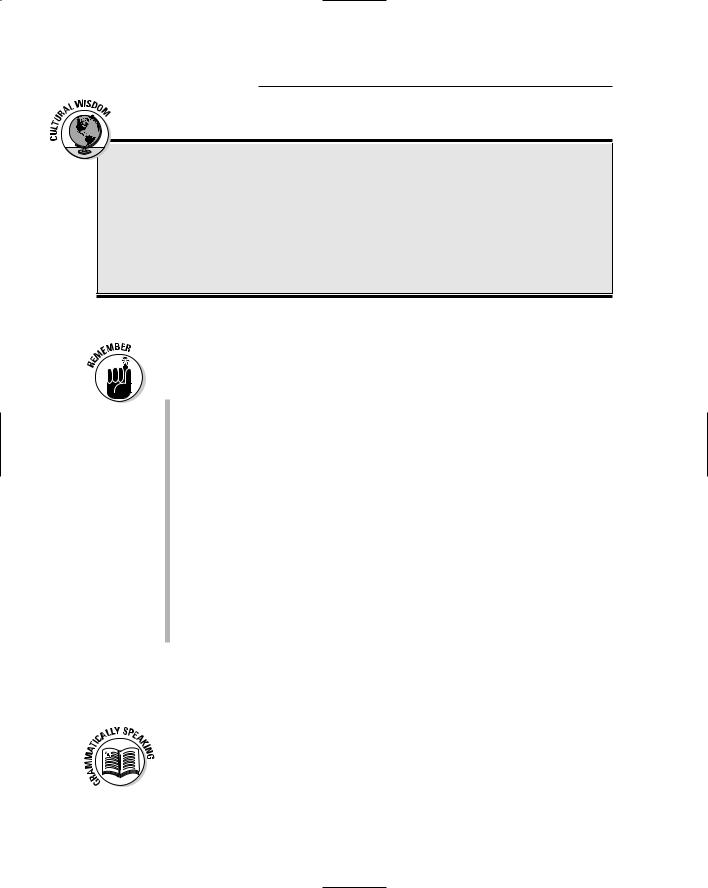
Russian For Dummies
.pdf
94 |
Part II: Russian in Action |
v shkolye (f shkoh-lee; at school)
v uchryezhdyenii (v ooch-reezh-dye-nee-ee; at an office)
v univyersityetye (v oo-nee-veer-see-tye-tee; at a university)
v yuridichyeskoj firmye (v yu-ree-dee-chees-kuhy feer-mee; at a law firm)
Let’s Get Together: Giving and Receiving
Contact Information
Just before you’re about to take your leave from a new Russian acquaintance, you probably want to exchange contact information. The easiest way to do this is just hand over your business card and say Eto moya kartochka (eh- tuh mah-yah kahr-tuhch-kuh; This is my card). In case you don’t have a business card, you need to know these phrases:
Moj adryes . . . (mohy ah-drees; My address is . . .)
Moya ulitsa . . . (mah-ya oo-lee-tsuh; My street is . . .)
Moj nomyer doma . . . (mohy noh-meer doh-muh; My house number is . . .)
Moj indyeks . . . (mohy een-dehks; My zip code is . . .)
And nothing’s easier than giving your phone number if you know your Russian numerals! (For more numerals, see Chapter 2.) Just say Moj nomyer tyelyefona (moy noh-mer tee-lee-fohn-uh; My telephone number is . . .) and the right numerals: Moj nomer tyelyefona 555 12 34. (moy noh-mer tee-lee- fohn-uh pyat’ pyat’ pyat’ ah-deen dvah tree chee-tih-ree; My telephone number is 555 12 34.)
Russian telephone numbers are always written and spoken as XXX-XX-XX. For more information about telephone calls, see Chapter 9.
After you give your contact info, be sure to get your new friend’s address, phone number, and e-mail address. You can use these phrases:
Kakoj u vas nomyer tyelyefona? (kuh-kohy oo vahs noh-meer tee-lee- foh-nuh; What’s your phone number?)
Kakoj u vas adryes? (kuh-kohy oo vahs ahd-rees; What’s your address?)
Kakoj u vas adryes po imyeilu? (kuh-kohy oo vahs ahd-rees puh ee-meh- ee-loo; What’s your e-mail address?)

Chapter 4: Getting to Know You: Making Small Talk 95
To answer these questions, you simply say
Moi nomyer tyelyefona . . . (mohy noh-meer tee-lee-foh-nuh; My telephone number is . . .)
Moi adryes . . . (mohy ahd-rees; My address is . . .)
Moj adryes po imyeilu . . . (mohy ahd-rees puh ee-meh-ee-loo; My e-mail address is . . .)
I’m Sorry! Explaining that You Don’t Understand Something
When you first start conversing in Russian, there will probably be a lot you don’t understand. You can signal that you don’t understand something in several ways. Choose the phrase you like best, or use them all to really get the message across:
Izvinitye, ya nye ponyal. (eez-vee-nee-tee ya nee pohh-nyel; Sorry, I didn’t understand; masculine)
Izvinitye, ya nye ponyala. (eez-vee-nee-tee ya nee puh-nye-lah; Sorry, I didn’t understand; feminine)
Izvinitye, ya plokho ponimayu po-russki. (eez-vee-nee-tee ya ploh-khuh puh-nee-mah-yu pah-roos-kee; Sorry, I don’t understand Russian very well.)
Govoritye, pozhalujsta, myedlyennyeye! (guh-vah-ree-tee pah-zhahl- stuh myed-lee-nee-ee; Speak more slowly, please!)
Kak vy skazali? (kahk vih skuh-zah-lee; What did you say?)
Povtoritye, pozhalujsta. (puhf-tah-ree-tee pah-zhahl-stuh; Could you please repeat that?)
Vy govoritye po-anglijski? (vih guh-vah-ree-tee puh uhn-gleey-skee; Do you speak English?)

96 |
Part II: Russian in Action |
 Fun & Games
Fun & Games
Which of the two words indicates a woman? See the answers in Appendix C.
1. a. amyerikanyets |
b. amyerikanka |
|
2. |
a. russkiye |
b. russkaya |
3. |
a. nyemtsy |
b. nyemka |
4. |
a. yevryejka |
b. yevryej |
5. |
a. frantsuzhyenka |
b. frantsuz |
Which of the three words doesn’t belong to the group? Check out the answers in Appendix C.
1.plyemyannik, syestra, brat
2.dyeduska, babushka, otyets
3.mat’, doch’, otyets
4.vnuchka, babushka, vnuk
5.syestra, brat, otyets
Which of the following statements just doesn’t make sense? (The word rabotayet (ruh-boh-tuh-eet) means “works.”) See the answers in Appendix C.
1.Aktyor rabotayet v teatrye.
2.Aktrisa rabotayet v teatrye.
3.Profyessor rabotayet v univyersityetye.
4.Domokhozyajka rabotayet na fabrikye.
5.Inzhyenyer rabotayet na zavodye.

Chapter 5
Making a Fuss about Food
In This Chapter
Talking about food fundamentals
Eating breakfast, lunch, and dinner
Shopping for food
Dining in restaurants and cafés
Russians are famous for their bountiful cuisine. Whether you like homemade food or prefer to go out to Russian restaurants, knowing how to
talk about food is helpful. In this chapter, we dish up a hearty helping of words and phrases for expressing hunger and thirst, using eating utensils, and observing Russian food etiquette. We discuss the different meals of the day and the famous Russian farmer’s market. We also discuss places to eat out, and what to say and do when you’re there.
Focusing on Food Basics
Because food has always been such an important part of Russian culture, Russian has a rich variety of words and expressions related to eating and drinking. In this section, we tell you how to say you’re thirsty and hungry in Russian, how to talk about the different eating utensils, and give you an overview of basic Russian table etiquette.
Eating up
When Russians are hungry they don’t say “I’m hungry.” Instead they say Ya khochu yest’. (ya khah-choo yest’; I’m hungry, Literally: I want to eat.) If you want to ask somebody if they’re hungry, you say:

98 |
Part II: Russian in Action |
Ty khochyesh’ yest’? (tih khoh-cheesh’ yest’; Are you hungry? Literally: Do you want to eat?; informal)
Vy khotitye yest’? (vih khah-tee-tee yest’; Are you hungry? Literally: Do you want to eat?; formal and plural)
In addition to these expressions, you may also hear one of these phrases:
Vy golodnyj? (vih gah-lohd-nihy; Are you hungry?), when speaking to a male
Vy golodnaya? (vih gah-lohd-nuh-ye; Are you hungry?), when speaking to a female
Vy golodnyye? (vih gah-lohd-nih-ee; Are you hungry?), when speaking to multiple people
To answer these questions, you say:
Ya golodnyj (ya gah-lohd-nihy; I’m hungry), if you’re male
Ya golodnaya (ya gah-lohd-nuh-ye; I’m hungry), if you’re female
Note that these phrases, however, have a particular flavor. In Russia golod (goh-luht; hunger) is a word that carries tragic historical connotations. So while it’s perfectly acceptable to use the above expressions, you should know that they also carry this darker, secondary meaning.
Table 5-1 shows you how to conjugate the Russian verb yest’ (yest’; to eat) for all the different pronouns. It’s an irregular verb, so you just have to memorize it. (For more on regular verb conjugations, see Chapter 2.)
Table 5-1 |
Conjugation of Yest’ |
|
Conjugation |
Pronunciation |
Translation |
ya yem |
ya yem |
I eat or I am eating |
|
|
|
ty yesh’ |
tih yesh’ |
You eat or You are eating |
|
|
(informal singular) |
|
|
|
on/ona/ono yest |
ohn/ah-nah/ah-noh yest |
He/she/it eats or He/she/it is |
|
|
eating |
my yedim |
mih ee-deem |
We eat or We are eating |
|
|
|
vy yeditye |
vih ee-dee-tee |
You eat or You are eating |
|
|
(formal singular and plural) |
|
|
|
oni yedyat |
ah-nee -ee-dyat |
They eat or They are eating |
|
|
|

Chapter 5: Making a Fuss about Food |
99 |
Drinking up
If you feel thirsty, you say Ya khochu pit’ (ya khah-choo peet’; I’m thirsty, Literally: I want to drink). When you want to ask somebody whether they’re thirsty, you say Ty khochyesh’ pit’? (tih khoh-cheesh’ peet’; Are you thirsty? Literally: Do you want to drink?; informal) or Vy khotitye pit’? (vih khah-tee- tee peet’; Are you thirsty? Literally: Do you want to drink?; formal)
The drinking verb pit’ (peet’; to drink) has an unruly conjugation, as shown in Table 5-2.
Table 5-2 |
Conjugation of Pit’ |
|
Conjugation |
Pronunciation |
Translation |
ya p’yu |
ya p’yu |
I drink or I am drinking |
|
|
|
ty p’yosh’ |
tih p’yosh’ |
You drink or You are drinking |
|
|
(informal singular) |
|
|
|
on/ona/ono p’yot |
ohn/ah-nah/ah-noh p’yot |
He/she/it drinks or He/she/it is |
|
|
drinking |
my p’yom |
mih p’yom |
We drink or We are drinking |
|
|
|
vy p’yotye |
vih p’yo-tee |
You drink or You are drinking |
|
|
(formal singular and plural) |
|
|
|
oni p’yut |
ah-nee p’yut |
They drink or They are |
|
|
drinking |
|
|
|
Just as in English, the Russian statement On/ona p’yot (ohn/ah-nah p’yot; He/she drinks) in certain contexts can signify that the person is an alcoholic. If that’s not your intention, you may want to add a direct object to the sentence to clarify your meaning.
Some common napitki (nuh-peet-kee; beverages) you may use as the direct objects are sok (sohk; juice), chaj (chahy; tea), kofye (koh-fye; coffee), vodka (voht-kuh; vodka), pivo (pee-vuh; beer), vino (vee-noh; wine), and a famous Russian kvas (kvahs) — a nonalcoholic beverage made of bread.
To say “I drink coffee” in Russian, you say Ya p’yu kofye (yah p’yu koh-fye). “I’m drinking vodka” is Ya p’yu vodku (yah p’yu voht’-koo). Notice that in this sentence vodka become vodku, the accusative case form of the noun, because it’s the direct object of the sentence. (For more on using the accusative case with direct objects, see Chapter 2.)

100 Part II: Russian in Action
Making room for the Russian tea tradition
The famous Russian tradition called chayepitiye (chah-ee-pee-tee-ye) is derived of two words — chaj (chahy; tea) and the noun pitiye (pee-tee-ye; drinking). Russians love tea almost like Brits do and drink it in huge quantities, usually in big glasses. In the old days, they used a
samovar (suh-mah-vahr) — a special, huge teakettle, placed in the middle of the table. Russians usually drink tea with sakhar (sah- khuhr; sugar) and homemade berry preserves called varayen’ye (vah-ryen-ye).
Using utensils and tableware
Here’s a list of the most common eating utensils and tableware:
blyudyechko (blyu-deech-kuh; tea plate)
chashka (chahsh-kuh; cup)
chaynaya lozhka or lozhyechka (chahy-nuh-ye lohsh-kuh or loh-zhihch- kuh; teaspoon)
glubokaya taryelka (gloo-boh-kuh-ye tuh-ryel-kuh; soup bowl)
kruzhka (kroosh-kuh; mug)
lozhka (lohsh-kuh; spoon)
nozh (nohsh; knife)
salfyetka (sahl-fyet-kuh; napkin)
stakan (stuh-kahn; glass)
taryelka (tah-ryel-kuh; plate)
vilka (veel-kuh; fork)
Imagine that you’re about to start eating a bowl of steaming soup but (much to your disappointment) you notice that you don’t have a spoon. This is what you may want to say: U myenya nyet lozhki. (oo mee-nya nyet lohsh-kee; I don’t have a spoon.)
After nyet, Russian uses the genitive case. For more on using nyet when expressing a lack of something, see Chapter 4. Chapter 2 has basic info on cases.
If you need to borrow a spoon from someone, you may ask that person by saying Mozhno lozhku? (mohzh-nuh lohsh-koo; Can I have a spoon?)

Chapter 5: Making a Fuss about Food 101
The construction Mozhno . . . (mohzh-nuh; Can/May I have . . .) + a noun is quite common in Russian. The noun takes the accusative case.
Minding basic Russian table manners
If you want to impress your Russian acquaintances, you should know basic Russian table manners. Some of the most important rules are related to using table utensils:
Hold your fork in your left hand at all times, if you use a knife.
Hold your fork in your right hand if you don’t need a knife to cut food. When Russians eat fish, for example, they don’t use a knife, and they hold the fork in the right hand.
When eating dessert, don’t use a fork; use a teaspoon instead.
Russians often find the American habit of cutting food into pieces before eating it very amusing. In Russia, only mothers do this for their young children. So when in a Russian restaurant, do as the Russians do. Never cut your food first with your knife and then put down the knife to hold your fork in the right hand. Always hold your knife in the right hand and your fork in the left hand, cutting pieces of food as necessary.
Enjoying Different Meals in Russia
Russians eat three meals a day: zavtrak (zahf-truhk; breakfast), obyed (ah- byet; dinner), and uzhin (oo-zhihn; supper). But Russian meals have quite a few peculiarities, which we tell you about in the following sections. We give you details on the amazingly flexible Russian breakfast, the hearty Russian midday meal, and the Russian dinner. Prepare your taste buds!
Russian for “to cook” is gotovit’ (gah-toh-veet’). So, if cooking is one of your hobbies, you can now proudly say Ya lyublyu gotovit’ (ya lyub-lyu gah-toh- veet’; I like/love to cook) when asked Vy lyubitye gotovit’? (vih lyu-bee-tee gah-toh-veet’; Do you like to cook?)

102 Part II: Russian in Action
What’s for breakfast? Almost anything!
The Russian breakfast is called zavtrak (zahf-truhk). What can you eat for zavtrak? The real question is what can’t you eat! In contrast to American cereal, fruit, or bagels, or the British porridge, or the French croissant and jam, the Russian zavtrak is very flexible. Some Russian breakfast favorites include
butyerbrod s kolbasoj (boo-tehr-broht s kuhl-buh-sohy; sausage sandwich)
butyerbrod s syrom (boo-tehr-broht s sih-ruhm; cheese sandwich)
kasha (kah-shuh; cooked grain served hot with milk, sugar, and butter)
kofye s molokom (koh-fye s muh-lah-kohm; coffee with milk)
kolbasa (kuhl-buh-sah; sausage)
kyefir (kee-feer; buttermilk)
syelyodka s kartoshkoj (see-lyot-kuh s kahr-tohsh-kuhy; herring with potatoes)
varyen’ye (vuh-ryen’-ee; jam)
yaichnitsa (ee-eesh-nee-tsuh; fried or scrambled eggs)
The management at Russian hotels in Moscow and St. Petersburg realize that such breakfast dishes as syelyodka s kartoshkoj may not appeal to all Western travelers, so the hotels try to accommodate their patrons’ tastes. Rest assured that you can get a decent Western-style breakfast in a hotel catering to the needs of Western guests. Use the following words to order Western-style breakfast foods:
behkon (beh-kuhn; bacon)
bliny (blee-nih; pancakes)
kholodnaya kasha (khah-lohd-nuh-ye kah-shuh; cereal)
kukuruznyye khlop’ya (koo-koo-rooz-nih-ee khlohp’-ye; corn flakes)
moloko (muh-lah-koh; milk)
ovsyanka (ahf-syan-kuh; oatmeal)
sok (sohk; juice)
tost (tohst; toast)
yajtsa (yay-tsuh; boiled eggs)
For the sake of fairness, we should mention that Russians share with Westerners their love of bliny (pancakes) and yajtsa (boiled eggs). Bliny, however, isn’t a dish exclusive to breakfast in Russia. Also note that you use the word yajtsa (yay-tsuh; boiled eggs) only in reference to boiled eggs rather than fried or scrambled eggs, which are yaichnitsa (ee-eesh-nee-tsuh).

Chapter 5: Making a Fuss about Food 103
Let’s do dinner (not lunch)
Obyed (ah-byet; dinner) is the main meal of the day and it’s usually eaten as a midday meal between 1 p.m. and 3 p.m.
Don’t make the common mistake of calling your evening meal obyed, because this may cause misunderstanding. Obyed is, in fact, your midday meal. What speakers of English call “lunch” doesn’t have an equivalent in Russian.
For their midday meal, Russians enjoy a four-course meal consisting of zakuski (zuh-koos-kee; appetizers), sup (soop; soup), vtoroye (ftah-roh-ye; the second or main course), and dyesyert (dee-syert; dessert), also called tryet’ye (trye-t’ee; third course).
The most popular Russian zakuski are:
baklazhannaya ikra (buh-klah-zhah-nuh-ye eek-rah; eggplant caviar)
kapustnyj salat (kah-poost-nihy suh-laht; cabbage salad)
salat iz ogurtsov i pomidorov (suh-laht iz ah-goor-tsohf ee puh-mee-doh- ruhf; salad made of tomatoes and cucumbers)
salat olivye (suh-laht uh-lee-v’ye; meat salad)
studyen’ (stoo-deen’; beef in aspic)
syelyodka (see-lyot-kuh; salt herring)
vinyegryet (vee-nee-gryet; mixed vegetable salad made with beets, carrots, and pickle)
vyetchina s goroshkom (veet-chee-nah s gah-rohsh-kuhm; ham with peas)
After zakuski comes the sup. You have many different kinds to choose from:
borsh’ (bohrsh’; beet root soup)
bul’yon (bool’-yon; broth)
kurinyj sup (koo-ree-nihy soop; chicken soup)
molochnyj sup (mah-lohch-nihy soop; milk soup)
sh’i (sh’ee; cabbage soup)
ukha (oo-khah; fish soup)
